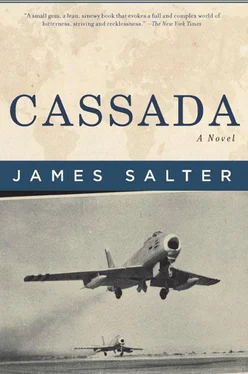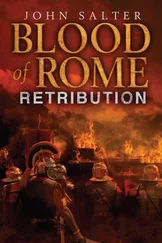They walked on. Trier was an old town of dark red brick, a town dating back to Roman times. It was historically important but not particularly interesting. There were the remains of a large amphitheater somewhere—Mayann had gone with the wives’ club to see it—some Roman baths, and vineyards up in the hills.
“I’m hungry,” Mayann said. “What time is it?”
“Almost twelve-thirty.”
“Do you want some lunch.”
In a restaurant with windows of brownish glass in rows of small circles, Godchaux ordered a beer.
“Do you like the local wine?” Mayann asked.
“Moselle, you mean? I’ve tried it. It’s all right.”
“Then you don’t like it?”
“I guess I like the beer more.”
“You know what I always say. I always say you should have what you want.” She was opening the menu. “But only…”
He waited, slightly nervous. He could not imagine what she was going to add.
“Only after you know what you want.”
The waitress was nearby. Godchaux said to her, “I’ll have the wine.”
“Moselle?”
“ Ja, Moselle. Another glass of Moselle.”
It was yellowish when it came. He drank it without much enthusiasm but ended up having a second glass of it.
“Have you ever played this?” Mayann said. She was laying out matches she had torn from a book of them. They formed a pyramid, five matches in the bottom row, three in the next, then one. Godchaux shook his head.
“No,” he said.
The rules, she explained, were simple. From any one row any number of matches could be removed. Then it was the other player’s turn, and so forth. The loser was the one who picked up the last match.
“You go,” she said.
Godchaux looked at the matches for a minute or two and picked up the single match. Mayann picked up two from the row of five. Godchaux casually picked up the remaining three from the same row. That left three matches in what had been the middle row. Mayann picked up two of them.
“I get it,” he said.
She laid them out again. This time he looked longer at the matches and picked up one from the row of five. She took away two from the same row. Godchaux took away one from the row of three. Mayann picked up the lone match from the top row.
Godchaux sat examining the situation. He saw he had lost again. If he picked up one or both matches from either row, she would remove both from the other row or just one.
“You win,” he said. “Is there a trick to it?”
“No trick.”
“There must be some trick.”
“What makes you think so?”
“You always win.”
The waitress was bringing their order.
“Not always,” Mayann said. “You look like someone who wins.”
He glanced up. She was not looking at him but at the plate being put before her.
“ Danke schoen, ” she said to the waitress.
“How did you and the major meet?” Godchaux said as he began to eat.
“We met in college.”
“Before he went to flying school.”
“I was pregnant when he went to flying school.”
“Oh, you were already married.”
“No.”
“Oh.”
“I was pregnant,” she said, “but I took care of it like a good girl.”
Godchaux didn’t know what to say. He nodded a little vaguely and, stealing a glance at her, continued to eat.
“Bud thinks the world of you, I guess you know that.”
Godchaux said nothing.
“He thinks… well, what do I need to tell you that for? Don’t you want to know what I think?”
She had often teased him. She did not seem to be teasing now.
“Yeah,” he said, admiring her.
“Don’t you already know?”
Trier was a port town, on the Moselle, and possessed, though neither of them had heard of it, a celebrated garment said to be the robe of Christ. It was not ordinarily on display and was brought out only rarely, when it attracted great crowds. Close to the well-preserved Roman gate was the chief hotel of the town. It had survived the war undamaged—Trier was not heavily bombed—and was comfortable if a little old-fashioned. In such hotels one expected comfort. The hallways were wide and the doors of the rooms, which were large and seemed to have too much space, were glossy with a perfect, almost plastic coat of white.
The hotel was the Porta Nigra, named for the Roman gate. It was there, not only on that day but on a number thereafter that Lancelot, aware of the danger, went with his queen.
The clouds were spread in all directions like a layer of curdled milk. Far above them flew two Canadians looking, as always, for a fight. No one else was up, however, and they had turned homeward when, at the very last, they saw two contrails, lower, distant, to the south.
“Let’s get those.”
“I’m down to twelve hundred pounds,” the wingman said.
“That’s plenty.”
They began a slow turn to bring themselves over and behind, and then rolled down. It was perfect. They hadn’t been seen. As they closed they saw the big droptanks, bathtubs. Americans. Four hundred knots. Almost in range. Suddenly the two planes in front of them pulled up together in a left turn and disappeared into the glare of the sun. The Canadian leader held up his thumb to cover it and then his entire hand. He didn’t see them. He continued to block out the sun, waiting for them to come out on one side of the glare or the other. Leveling out, he kept looking and heard his wingman call, “Eight o’clock!”
He strained to look back, over his shoulder. Sure enough, there they were.
“Hard left!” he called.
They began a tightening circle, turning amid their own contrails, which were persistent and thick. In the end the two opposing leaders were heading straight down, speed brakes out, canopy to canopy, rolling around each other like a barber pole. Through the very top of the canopy the Canadian could look into the other cockpit and see the pilot’s head there, thrown back too. They were that close, absolutely vertical, the rate of descent needle straight down, the altimeter spinning like a wheel. Around and around, headed for the clouds until just above them they pulled out and began scissoring, almost in a stall, noses high, lurching past each other.
Slowly, sweat pouring from him, the Canadian began, because of the tanks, to get the better of it, skimming over the cloud surface. Suddenly, out of the corner of his eye he caught sight of the second American, come from he didn’t know where and unbelievably close, the intake as big as a piano. Without pausing he pushed over and into the clouds.
He was safe there, unfollowable. He made several turns and at the end climbed out again, half expecting to see them waiting like terriers over a rat hole, but they were gone. He couldn’t see them anywhere, nor his wingman. He called but got no answer. Only when he was nearly back to the base at Gros Tenquin did he get the wingman to reply.
“What happened to you?”
“I lost you when we went below the cons,” the wingman said.
“I’ll say you did.”
The victors of the combat in which they had been matched against cleaner airplanes landed low on fuel in light rain. The ceiling had come down. The leader—it was Grace—was summoned from the locker room almost immediately. Isbell had learned from the servicing crew how much fuel had been left in the planes.
“Debrief later,” he told Grace. “I want to talk to you.”
“Yes, sir,” said Grace in a serious voice, his flying suit dark where he’d been sweating beneath his parachute.
The door closed behind them.
In the briefing room, Godchaux waited, biting at the corner of a fingernail and looking at the floor. When somebody asked him a question he answered with only a grin. He bit at his fingernail again.
Читать дальше












